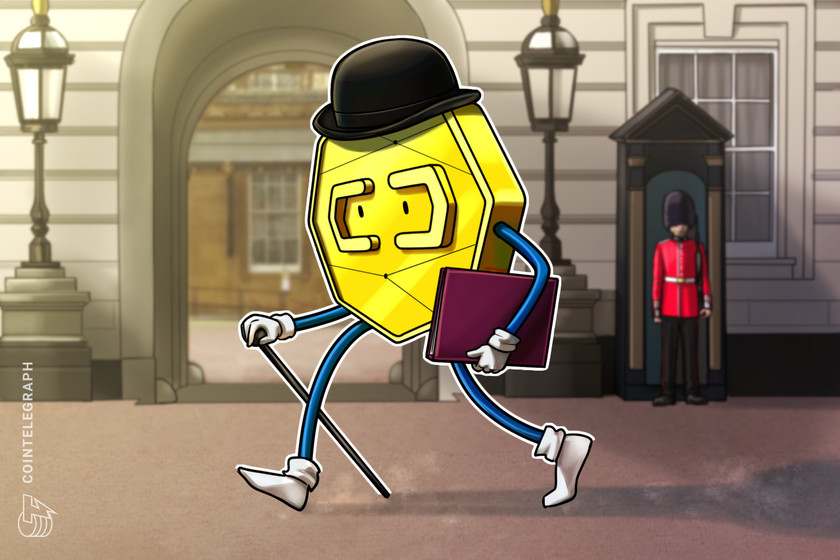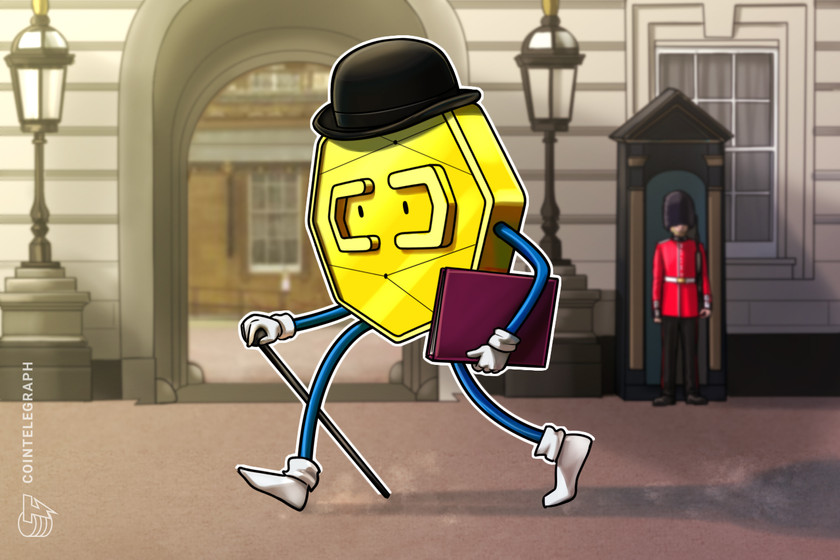UK forms Bitcoin Policy org to boost BTC education and adoption


A Bitcoin-only policy organization in the United Kingdom seeks to steer a course for greater levels of BTC adoption.
God save our gracious coin, and long live the coin. A team of entrepreneurs, environmentalists and Bitcoin (BTC) advocates have assembled to back Bitcoin in Britain.
Bitcoin Policy UK (BPUK) unites stakeholders, policymakers, environmentalists, tax specialists, Bitcoin experts and miners to “unlock the potential of Bitcoin” in Britain and explore how the decentralized currency’s burgeoning industry could benefit U.K. households, businesses and communities.
BPUK’s primary objectives are to drive investment, generate and prepare students for the Bitcoin jobs of the future, raise awareness and education, and explore the use of wasted and stranded energy resources for Bitcoin mining.
Freddie New, BPUK’s head of policy, told Cointelegraph that “the genesis of this project was the Bitcoin Collective Conference in Edinburgh” — the U.K.’s largest Bitcoin conference, taking place in fall 2022.


New told Cointelegraph that most of the team had been working on Bitcoin advocacy in one way or another before the conference, “but coming together like this will enable us to formalize these efforts and focus on three key related areas.” He continued:
“Getting clear and correct information on Bitcoin to policymakers and regulators, highlighting the environmental and sustainability benefits of the mining industry, and collating and providing educational resources for the next generation of Bitcoiners.”
Some of the advisers and board members are familiar to Cointelegraph readers. Author and journalist DecentraSuze, whose son recently introduced Bitcoin to the classroom, is a director, while Jordan Walker, co-founder of The Bitcoin Collective, and Mark Morton are advisers. Morton’s Bitcoin mining company, Scilling Digital Mining, was featured in a recent Cointelegraph mini-documentary:
Walker told Cointelegraph that the BPUK is an important piece of the collective puzzle to drive Bitcoin education in the U.K.:
“It’s time for the UK to step up when it comes to embracing new technologies such as Bitcoin, otherwise we risk getting left behind.”
New told Cointelegraph that the BPUK is not-for-profit. To operate, it hopes to raise funds through the community, tapping into the growing trend of funding projects with satoshis, or small amounts of BTC, via the Lightning Network, a layer-2 instant payment solution built atop Bitcoin.
Part of the team’s mission is to locate and harness renewable, wasted or stranded energy across the U.K., New explained.
“We’re working […] to identify potential sites for sustainable mining, and our aim is to develop some small mining installations to use as ‘proof-of-concept’ sites.
He continued with the plan: “We can then invite British policymakers to these sites so they can see mines in action and hopefully understand more about the industry’s potential to mitigate vented methane, provide demand response for renewable grids, or simply act as a customer for energy that is otherwise wasted.”


The U.K. has burgeoning renewable energy sources but lacks in hash rate (a measure of the Bitcoin protocol’s security). According to the Cambridge Center for Alternative Finance, the U.K. supports 0.23% of the global monthly hash rate, compared with the United States’ 37.84%.
This is partly due to electricity costs in the U.K. exceeding those of the U.S. and Asia, but also due to Bitcoin mining awareness — or a lack thereof — in the U.K. Moreover, legacy media platforms have taken aim at the Bitcoin mining industry in recent years — the Guardian critiqued Bitcoin as “digital beef” instead of “digital gold.”


BPUK highlighted that in light of the U.K.’s departure from the European Union, it could develop a Bitcoin and cryptocurrency regime separate from that of the Markets in Crypto-Assets (MiCA) regulation in Europe. The European parliamentary committee on MiCA may threaten Bitcoin mining on the continent.
BPUK co-founder Krista Edmunds took inspiration from El Salvador’s decision to adopt Bitcoin as legal tender in 2021. Edmunds explained:
“The U.K. has an immense opportunity to become one of the first jurisdictions globally to embrace Bitcoin. We have seen what is possible in El Salvador, which is experiencing huge gains due to its forward-thinking approach to Bitcoin. The U.K. can secure a similar competitive advantage, and we hope to support the British people in making that happen.”
On the governmental side, the policy group will have an opportunity to educate and inform. Lisa Cameron, a member of Parliament and chairperson of the Crypto and Digital Assets All-Party Parliamentary Group (APPG), told Cointelegraph in an interview last year: “We are on a learning curve, and it’s just very, very important because the U.K. government has a policy vision that the U.K. will become an international hub of cryptocurrency and digital assets.” She added that there was some confusion surrounding Bitcoin, central bank digital currencies and cryptocurrency.


New explained that as a Bitcoin-only organization, the BPUK ultimately seeks to “make sure that Bitcoin is included in the government’s proposals, if not at the front and center.”






















